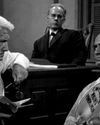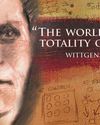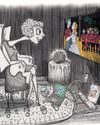Intentar ORO - Gratis
On Casuistry
Philosophy Now
|December 2020 / January 2021
Jason Morgan advocates justice without legislation.

We have largely forgotten that there is another way to pursue justice than by deciding what the answer to every problem is going to be ahead of time through legislation. Casuistry or case-centric jurisprudence is anti-legislation. It is the practice of taking each case as it comes, using judgment to discern the right outcome, while allowing plenty of room for mitigating or exacerbating circumstances. It is not a technique, but a state of mind. It involves taking a few steps back and thinking about what we see and hear with our own eyes and ears instead of trying to fit circumstances into the tight definitions in lawbooks. Judges who practice casuistry put their own intuition and, yes, judgment, ahead of what’s written down in laws compiled by people in faraway places.
Casuistry requires a major conceptual shift, from ‘classical’ to ‘quantum’ jurisprudence we might say. We are used to seeing court cases as equations where legal formulas are filled in with information and the results issue forth in ‘Guilty’ or ‘Innocent’ verdicts. However, casuistry sees cases in terms of relationships among people connected by a common injustice and requiring the careful, attentive, thoughtful, and imaginative application of fair judgment in order to right the wrong and restore all parties to good graces with one another as best as can be done. Under casuistry, justice is a work in progress, with a lot of gray mixed in with the black and white. There are no Newtonian certainties, only Heisenbergian approximations.
Ancient Judgments
Esta historia es de la edición December 2020 / January 2021 de Philosophy Now.
Suscríbete a Magzter GOLD para acceder a miles de historias premium seleccionadas y a más de 9000 revistas y periódicos.
¿Ya eres suscriptor? Iniciar sesión
MÁS HISTORIAS DE Philosophy Now

Philosophy Now
Pharmaco-Metaphysics?
Raymond Tallis argues against acidic assertions, and doubts DMT discoveries.
7 mins
August/September 2025

Philosophy Now
Nine Spiritual Exercises
Massimo Pigliucci explains how to get Philo-Sophical.
3 mins
August/September 2025

Philosophy Now
Books
We follow mammal's search for meaning, as Mark Vorobej savages John Gray's book of impractical cat philosophy, while B.V.E. Hyde ponders the point of Jordan Peterson. In Classics, Hilarius Bogbinder reviews Plato's Republic.
21 mins
August/September 2025

Philosophy Now
The Centennial of the Scopes ‘Monkey’ Trial
Tim Madigan on the creation and the evolution of a legend.
14 mins
August/September 2025

Philosophy Now
Gödel, Wittgenstein, & the Limits of Knowledge
Michael D. McGranahan takes us to the edge of language, mathematics and science.
10 mins
August/September 2025

Philosophy Now
Weltschmerz and the World
Ian James Kidd takes a realistic and global view of the history of pessimism.
10 mins
August/September 2025
Philosophy Now
What Makes A Work Of Art Great?
Each answer below receives a book. Apologies to all the entrants not included.
16 mins
August/September 2025

Philosophy Now
The Beatles: Nothing is Real
Clinton Van Inman gets back to the psychedelic Sixties.
4 mins
August/September 2025

Philosophy Now
The Post-Truth Kerfuffle
Susan Haack, who is Distinguished Professor in the Humanities, Cooper Senior Scholar in Arts & Sciences, Professor of Philosophy, and Professor of Law, at the University of Miami, talks with Angela Tan about how and when we know.
11 mins
August/September 2025

Philosophy Now
A Crisis of Attention
Paul Doolan attends to our culture of attention demanding.
13 mins
August/September 2025
